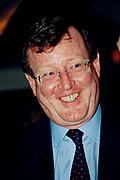| Party | Regional list candidates [2] |
|---|
| UUP | David Trimble , John Taylor , John Gorman , Antony Alcock , Jack Allen, Fred Parkinson, Josias Cunningham, Dennis Rogan, James Cooper, Jim Nicholson |
| SDLP | John Hume , Seamus Mallon , Eddie McGrady , Joe Hendron , Jonathan Stephenson , Dorita Field , Margaret Ellen, Patricia Walsh, Marietta Farrell, Rosaleen Hughes, Anne McQuillan |
| DUP | Ian Paisley , Peter Robinson , William McCrea , Nigel Dodds , Sammy Wilson , Gregory Campbell , Eric Smyth , Ruth Allen, Harry Smith, William McClure |
| Sinn Féin | Lucilita Bhreatnach , Pat Doherty , Rita O'Hare, Gerry Adams , Martin McGuinness , Bairbre de Brún, Mitchel McLaughlin , Gearóid Ó hEára, Joe Cahill, Dodie McGuinness |
| Alliance | John Alderdice , Seamus Close , Sean Neeson , Steve McBride , Eileen Bell , Anne Gormley, Elizabeth McCaffrey, Mary Clark-Glass, Susan O'Brien, Wendy Watt |
| UK Unionist | Robert McCartney , Cedric Wilson , Conor Cruise O'Brien , Patrick Roche, Ronnie Crawford, Alan Field, Valerie Kinghan, Stephen Nicholl, Graeme Jardin, Freda Woods |
| PUP | Hugh Smyth , David Ervine , Billy Hutchinson, William Smith, David Kirk, Patricia Laverty, Dawn Purvis, Edward Kinner, Gusty Spence, Winston Churchill Rea |
| Ulster Democratic | Gary McMichael , John White , David Adams, Joe English, Tommy Kirkham, David Nicholl, Robert Girvan, Thomas English, Ester McCracken English, Elizabeth Cathcart McIlwaine |
| NI Women's Coalition | Monica McWilliams , Pearl Sagar , Anne Campbell, Kathleen Fearon, Sheila Fairon, Joan Cosgrove, Diane Greer, Brenda Callaghan, Felicity Huston, Mairead Abraham |
| Labour coalition | Malachi Curran , Hugh Casey , Mark Langhammer, John McLaughlin, Lucy Simpson, Peter Hadden, Margaret Lawrence, Fionnuala Harbinson, Michael Duffy, David Morrison |
|
| Green (NI) | Paddy McEvoy, Peter Emerson, Jenny Jones, Nuala Ahern, Molly Scott, Robin Harper |
| NI Conservatives | Barbara Finney, Esmond Birnie |
| Workers' Party | Tom French, John Lowry, Marian Donnelly, Ellen Rush, Margaret Smith, Tommy Owens, Brendan Heany, Eilish Duffy, Vivian Hutchinson, Michael McCorry |
| Ulster Independence | Hugh Ross, Josephine Fulton-Challis, Sandra Jones, Walter Millar, David Kerr, Dierdre Speer-White, Ken Kerr, Donal Casey, Kenneth McClinton, Norman McLelland |
| Democratic Left | Mary McMahon, Seamus Lynch, Patrick John McClean, Gerry Cullen, Veronica McEneaney, Frank McElroy, Teresa McVeigh, Jean Craig, Mary Vernon, Monica Hynds |
| Democratic Partnership | David Bleakley, Paul Smyth, Maureen McCaughan, Adrian McKinney, Pearl Snowden, Edwin Sloan, Charles McKee, William Lewis, Erin Tunney |
| Independent McMullan | Oliver McMullan, John Robb, John McDowell, Wesley H. Holmes, William Dunbar, William Cunning, Helen Craig, Philip Dugdale, Charles Maunsell, Sinead McMullan |
| Independent Chambers | Alan Chambers, Joseph Coggle, Mary Chambers, James Arbuthnot, Robert Irvine, Violet Chambers, Linda Chambers, William Chambers, Ruth Patty, Pearl Brown |
| Natural Law | James Anderson, Thomas Mullins, Richard Johnson, John Patrick Lyons, John Small |
| Independent DUP | Thomas Henry O'Brien, William Baxter, Cecil Braniff, Tara Martin Alexandra, Stuart William O'Brien |
| Independent Arthur Templeton | N/A |
| Independent Voice | Andrew Thompson, Sarah Thompson, Bernard McGrath, Susan McGrath, Edward Phillips, Trevor Richards, Christopher Carter, Fidelma Carter, Betty Carter, Susan Carter |
| Communist | N/A |
| Ulster Christian Democrats | N/A |










